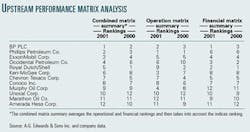A.G. Edwards: Majors' operating measures mixed, healthy
Overall oil market fundamentals remained strong during 2001, as shown by the higher-than-average financial performances of a sampling of integrated oil and gas companies. Robust oil prices and above-average US natural gas prices and refining margins drove these gains.
On the operations side, costs rose while key reserves and production indicators remained robust. A.G. Edwards & Sons Inc. released these findings in an integrated oil company upstream matrix performance analysis.
The brokerage firm took note of the tight rein the integrated firms kept on finances last year.
"Nonetheless, financial measures were mixed with higher per-unit operating costs, exploration expenses, and (depreciation, depletion, and amortization), resulting from an increase in oil field service costs and higher cost structures associated with a series of recent acquisitions," A.G. Edwards added. "And although net profit, cash flow, and return on capital employed (ROCE) declined from year-ago levels, they remained significantly higher than 5 and 10-year averages," it said.
In its 2001 Upstream Matrix Performance Analysis, A.G. Edwards ranked BP PLC, Phillips Petroleum Co., and ExxonMobil Corp. as top quartile performers (see table).
Finding, development costs
Among the group, worldwide finding and development costs-which excluded purchases and sales-rose 7%, averaging $5.56/boe for 2001, A.G. Edwards reported. This compares to the 2000 average of $5.18/boe and falls well above the 3, 5, and 10-year averages of $5.22/boe, $5.14/boe, and $5.00/boe, respectively.
"The higher F&D costs reflect the increased capital spending," the firm said. "Both exploration and development costs were higher YOY (domestic exploration up 4%, foreign exploration up 27%, domestic development up 47%, foreign development up 40%) in part due to rising oil field service costs and a ramp-up of exploration and development projects," A.G. Edwards noted.
Reserve replacement
The report stated that 2001 worldwide reserve replacement-again, excluding purchases and sales-was unchanged vs. 2000 at 37%. Reserve replacement was, however, "modestly" above the respective 3, 5, and 10-year averages of 129%, 124%, and 117%, A.G. Edwards said.
"Based on a 3-year average, reserve replacement (rates) increased in 2001 ellipsebenefiting from improvements in both the domestic and international markets (US up 10% to 95% and international up 3% to 149%)," the firm said. "In the US, both oil and gas experienced significant reserve additions (oil, up 21% to 99% and natural gas, up 9% to 89%)."
Outside the US, the oil reserve replacement rate increased by 1% to 157%, while the non-US natural gas reserve replacement rate declined 12% to 116%.
Reserves, production
For 2001, the sample group's total worldwide proved reserves improved 4% to 85.5 billion boe, A.G. Edwards noted, with liquids reserves rising 3% and natural gas up 4%. Reserves in the US increased 2% to 24.8 billion boe from 24.4 billion boe the year before. Reserves outside the US, meanwhile, increased 5% to 60.9 billion boe from 58.2 billion boe, A.G. Edwards said.
Total worldwide production for the group rose 3% to 6.6 billion boe in 2001 from 6.4 billion boe in 2000, above both the 5 and 10-year average growth of 1%. Production in the US rose 3%, with liquids production up 2% and natural gas production up 3%. Likewise, production outside the US was up 3%, with liquids production flat and natural gas production up 8%, the firm said.
Worldwide reserve life for the group in 2001 reached an average of 12.1 years, up 3% from 11.8 years in 2000.
Financial performance
Operating costs for the group worldwide in 2001 climbed to $4.88/boe from $4.46/boe in 2000. In the US, operating costs were $4.87/boe, and they were $4.54/boe in non-US operations, reflecting a 15% and 5% increase, respectively, from the previous year.
The firm said, "As expected, robust earnings last year led to higher exploration budgets, resulting in worldwide exploration expenses (per barrel of oil equivalent) increasing by 7% to $1.40 from $1.31 in 2000. International exploration expenses were up 30% to $1.57, more than offsetting an 18% decline in the US."

